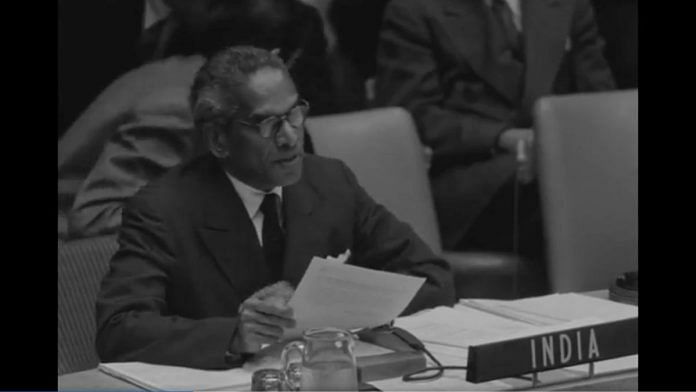It will be recalled that the last time the Security Council considered this matter was on 23 December 1952, which is more than four years ago, a fact which is not without significance because, at a later stage in his remarks, the representative of Pakistan attempted to convey to the Council the feeling that there was a crisis developing in this matter. I shall refer to that factor in a moment.
It was the Government of India that came here in the first instance. The Government of India came here on 1 January 1948. It is not usual for a Government of average ability and intelligence, as mine is, to come before the Security Council and to invite its attention to the wrongs it has done. In this particular case it has done nothing wrong, and in any case the matter is clear in itself.
We felt, as indeed my predecessor in this chair pointed out to the Council at that time, that there is no dispute about territory. If it were a dispute about territory, I say with great respect that the Security Council would be incompetent to deal with it because that would be either a political or juridical question, and under Chapter VI or Chapter VII of the Charter the Security Council would only deal with questions of international peace and security. So we brought here a situation and not a dispute.
Therefore, our starting point is that we came here in order to file a complaint, to ask for redress on a charge of aggression. If Pakistan does not mention this starting point, then we have to point out why we were so concerned about it. After all, there are difficulties sometimes. Even today we have frontier raids one way or another. But why did we then ask the Security Council to deal with this matter? If Pakistan does not do so, that is to say, halt the aggression, the Government of India may be compelled in self-defence – and I interpolate that self-defence is not only a right of the member States of the United Nations but, I submit, it is an obligation that member States have under the Charter because they have an obligation to maintain the sovereignties of their own countries – the Government of India may be compelled in self-defence to enter Pakistan territory, which we did not do, in order to take military action against the invaders. The matter is, therefore, one of extreme urgency and calls for immediate action by the Security Council for avoiding a breach of international peace.
As the delineation of this picture becomes more complete it will be clear that the efforts of India and of the Security Council and so on have at earlier stages been primarily addressed to the halting of hostilities.
Therefore, our country was faced with the position that part of its territory was invaded, and that invasion had to be resisted; it had to be pushed back. The normal practice of war would have been to defend by attacking the invader. But this was in 1947, and it was a fact, which remains true to us at any rate today, that these were the same people who were part of our country but ten years ago. What is more, between January 1947… and October, when these things started, our two countries had only just passed through the holocaust of fratricide, that is, of Indian people killing Pakistanis, and Pakistanis killing Indians. We had witnessed an orgy of violence, and it was the desire of our Government that nothing should be done to rekindle these embers which were still burning at that time.
That was the original position, and I shall keep coming back to it. We are here on a complaint of aggression. That aggression has not been resolved; it has not been got rid of. So long as there are forces of other countries in a place where they have no right to be, irrespective of our rights, I think the Security Council is called upon under the provisions of the Charter to act accordingly.
In this context, so many trees have grown, and a very considerable amount of undergrowth, that it is impossible to see the wood properly, and it will be my attempt to present it as best we can. We shall try to assist the Security Council to see this picture as it was. As I said, five years ago we debated this, and in five years – even apart from the nine years – a great many things happen. It is part of the inevitable practice of nations that the changes in conditions that time brings about and which may go to the root of a question have also to be taken into account.








